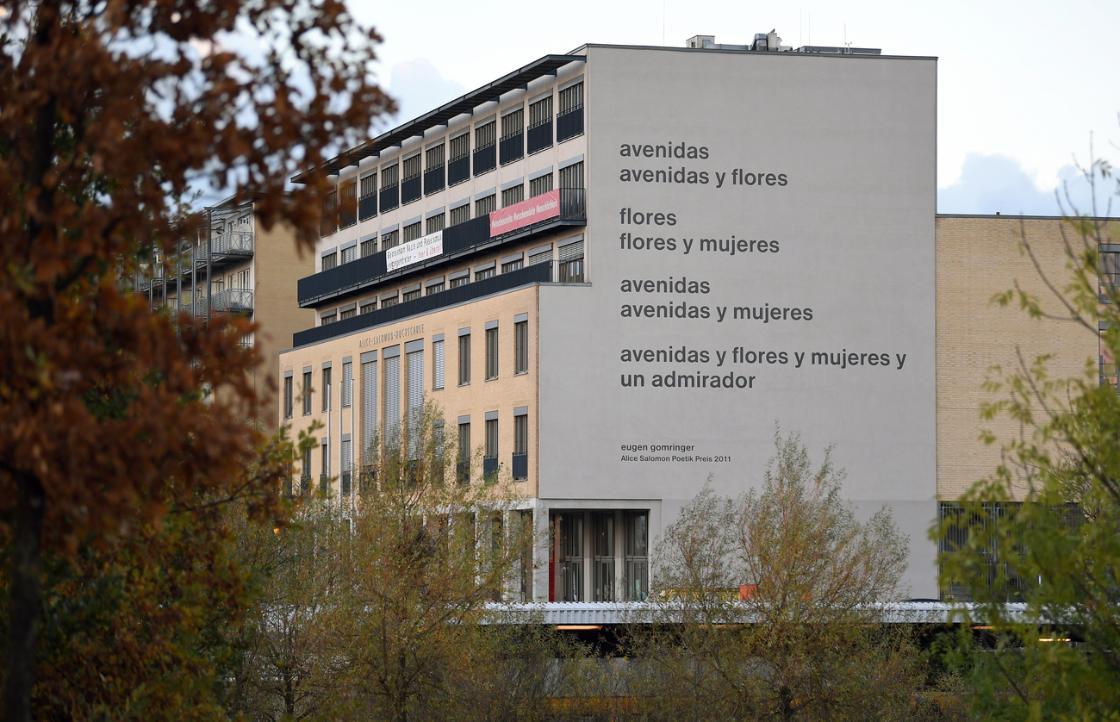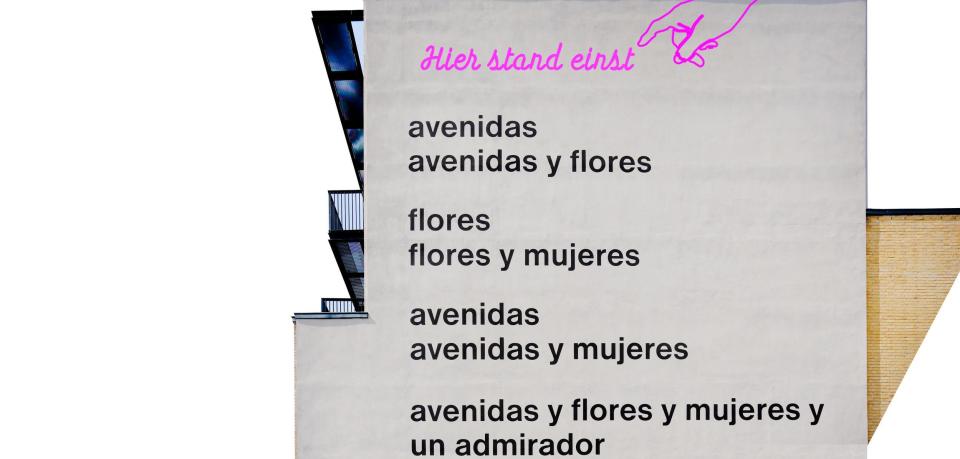Adios Avenidas: Poetry as Sexual Aggression?
The question: can a poem be a sexual aggression? Or more precisely: can this, the above poem, by Swiss-Bolivian poet Eugen Gomringer be seen as a sexually aggressive poem & therefore condemned to be removed from the Berlin high school — the Alice-Salomon-Hochschule — where it has adorned a side-wall for a few years now?
Here’s the poem in my English translation:
avenues
avenues & flowersflowers
flowers & womenavenues
avenues & womenavenues & flowers & women &
an admirer
I remain gob-smacked: for a year now hundreds of newspaper articles & radio-interventions have dissected the aesthetic & ethical pros & cons of this little, rather harmless, 20-word poem. No poem has been more intensely & widely discussed in Germany in recent history — which may be the best part of this whole insanity. But a decision has now been taken: the school’s students’ representative committee has come to the conclusion that the poem smacks “unpleasantly” of sexual agression. And the poem will be removed & replaced with another poem (&, further decision, there will now be a new poem every 5 years — something that hadn’t been part of the initial idea).
Meanwhile Gomringer’s poem will be “remembered,” in that a commemorative plaque with the poem in Spanish, German & English will be affixed to the bottom of the wall. As the journalist Bendict Neff writes in the Neue Züricher Zeitung: “The Germans are masters of memorial-culture, this comes well to the fore concerning the Avenida-wall. The past is wiped out, but then a plaque will point to it. This process corresponds to the German capital: Berlin is a city without tradition, it is a city of recollections. (Berlin ist eine Stadt ohne Tradition, es ist eine Stadt der Erinnerung.)”
Gomringer — who wrote the poem in 1950 & who is now 93 — commented on the whole affair: “To achieve such an effect with so few words, that has always been my aim.” His daughter, the poet Nora Gomringer, has meanwhile started a guerrilla action & wants posters & handouts of the poem to be distributed & glued everywhere. You can check this out at #avenidas and read her thoughts here. She has also suggested a sardonic improvement of the picture of the wall via a blinking neon heading that reads “Here once stood” above the poem (see below).
Addendum: My certainty about the silliness of the removal & wall-cleaning has been shaken by Nicole Peyrafitte’s, my wife’s, take: Nicole, after reading the poem carefully a few times, did come to the conclusion that the poem is insulting & demeaning to women, that it is but an old washed-up male romantic trope that associates “women” (a generalization) here with flowers and architectural matters, in effect dehumanizing them. A macho gaze, thus, that I was not able to recognize as such. Which is true: I did not read the poem that way, thought of it mainly as a minor lyrical statement of a somewhat classical Latin-American romantic facture. What was uppermost on my mind was the question of censorship.
Where I do agree with Nicole is that it is good that the poems on that school wall be changed, a new one put up every few years — actually there are so many good poems around that one a year would be better. The next wall-poem will be by Barbara Köhler — & I hope it will be from her book Neimands Frau (Nobody’s Woman) which tells the story of the Odyssey form the perspective of its female characters.



 Poasis II: Selected Poems 2000-2024
Poasis II: Selected Poems 2000-2024 “Todesguge/Deathfugue”
“Todesguge/Deathfugue” “Interglacial Narrows (Poems 1915-2021)”
“Interglacial Narrows (Poems 1915-2021)” “Always the Many, Never the One: Conversations In-between, with Florent Toniello”
“Always the Many, Never the One: Conversations In-between, with Florent Toniello” “Conversations in the Pyrenees”
“Conversations in the Pyrenees” “A Voice Full of Cities: The Collected Essays of Robert Kelly.” Edited by Pierre Joris & Peter Cockelbergh
“A Voice Full of Cities: The Collected Essays of Robert Kelly.” Edited by Pierre Joris & Peter Cockelbergh “An American Suite” (Poems) —Inpatient Press
“An American Suite” (Poems) —Inpatient Press “Arabia (not so) Deserta” : Essays on Maghrebi & Mashreqi Writing & Culture
“Arabia (not so) Deserta” : Essays on Maghrebi & Mashreqi Writing & Culture “Barzakh” (Poems 2000-2012)
“Barzakh” (Poems 2000-2012) “Fox-trails, -tales & -trots”
“Fox-trails, -tales & -trots” “The Agony of I.B.” — A play. Editions PHI & TNL 2016
“The Agony of I.B.” — A play. Editions PHI & TNL 2016 “The Book of U / Le livre des cormorans”
“The Book of U / Le livre des cormorans” “Memory Rose Into Threshold Speech: The Collected Earlier Poetry of Paul Celan”
“Memory Rose Into Threshold Speech: The Collected Earlier Poetry of Paul Celan” “Paul Celan, Microliths They Are, Little Stones”
“Paul Celan, Microliths They Are, Little Stones” “Paul Celan: Breathturn into Timestead-The Collected Later Poetry.” Translated & with commentary by Pierre Joris. Farrar, Straus & Giroux
“Paul Celan: Breathturn into Timestead-The Collected Later Poetry.” Translated & with commentary by Pierre Joris. Farrar, Straus & Giroux
Very interesting addendum also!
re addendum: if women find the poem demeaning to them, then it is demeaning to women. It’s interesting that it takes your wife to state this for you hear it. The certainty of silliness speaks loudly. More listening needed.